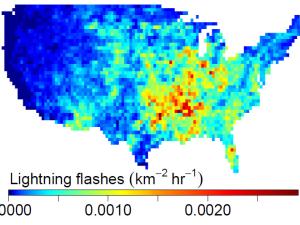

Research Bio
David Romps is a professor in the Department of Earth and Planetary Science. His research group at UC Berkeley and LBNL uses theory, simulation, and observation of clouds and atmospheric dynamics to improve our understanding of Earth's climate.
Research Expertise and Interest
climate, atmosphere, atmospheric science, weather, clouds, fluid dynamics
In the News
The Heat Index — How Hot It Feels — Is Rising Faster Than Temperature
Today’s Heat Waves Feel a Lot Hotter Than Heat Index Implies
In media coverage of climate change, where are the facts?
Lightning Expected to Increase by 50 Percent with Global Warming
Today’s climate models predict a 50 percent increase in lightning strikes across the US during this century as a result of warming temperatures associated with climate change. UC Berkeley climate scientists look at predictions of precipitation and cloud buoyancy in 11 different climate models and conclude that their combined effect will generate more frequent electrical discharges to the ground.
Featured in the Media
An analysis of the New York Times' coverage of climate change since 1980 reveals that the paper has poorly presented the basic facts that could persuade skeptics that the problem is real, that it's happening now, that the changes will be permanent, and that humans are responsible for it. "If The New York Times isn't doing it, my guess is that it is just not happening across print journalism," says earth and planetary science professor David Romps, who co-authored the paper with Jean Retzinger, former associate director of Berkeley's Media Studies program. "One of the hopes is that, by at least pointing this out, it might occur to people to take a look at what kind of context is provided in news coverage of climate change." As an example of the poor coverage, the researchers found that only 4 percent of the paper's climate change stories mentioned that there's a scientific consensus on the issue, with 99 percent of scientists in agreement. "The notion that there is a scientific consensus has been referred to as a gateway belief by people who study how the public thinks about climate change," Professor Romps says. "They find that, if you can get people to understand that fact, it kind of pries the door open and makes them open to learning more and potentially changing their minds." This story originated at Berkeley News.




